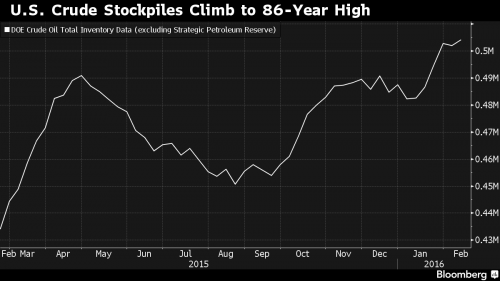It's High Noon for Frackers and Tar Sand Miners
It's going to be March Madness on the shale oil patches this year, but not the fun kind.
The U.S. shale industry must come up with $1.2 billion in interest payments by the end of March as $30-a-barrel oil makes it harder for companies to scrape up the cash needed to stay current on their debts.
Almost half of the interest is owed by companies with junk-rated credit
The fracking industry is facing $9.8 billion in interest payments this year. It's not going to happen. Oil prices are simply too low.
Just to give you an idea of what is coming, on Tuesday Energy XXI Ltd. defaulted, and on Wednesday SandRidge Energy Inc. defaulted. 48 frackers went bankrupt last year (53 energy companies in all), but that's nothing compared to what's in the pipeline.
Roughly a third of oil producers are at high risk of slipping into bankruptcy this year as low commodity prices crimp their access to cash and ability to cut debt, according to a study by Deloitte, the auditing and consulting firm. ...
The roughly 175 companies at risk of bankruptcy have more than $150 billion in debt, with the slipping value of secondary stock offerings and asset sales further hindering their ability to generate cash, Deloitte said in the report, released Tuesday.
"These companies have kicked the can down the road as long as they can and now they're in danger of kicking the bucket," said William Snyder, head of corporate restructuring at Deloitte, in an interview. "It's all about liquidity."
That prediction is the four horseman of the apocalypse for the energy industry. One hundred and seventy-five bankrupt energy companies in a single year would mean a complete collapse of the economies of the oil patches.
The axe will fall most heavily with shale.
The major multinationals won't take the hit, given their strong balance sheets and huge economies of scale. Instead, a disproportionate share of the necessary global production cuts will fall on the over-leveraged producers of U.S. shale, where output is now beginning to drop, finally...
We don't know how far U.S. shale production will now fall. But with U.S. crude oil inventories standing at about 60 days of consumption, nearly 20% above their long-term average, the outlook is bleak. The picture has been made worse by the ending of sanctions on Iran, which the government says will result in production rising by an incremental one millions barrels per day over the next two years. That's new supply equivalent to more than a quarter of the rise in shale output in the past three years alone. We can't avoid the conclusion that U.S. shale production is going to have to drop a long way.
The wipeout will be no less spectacular north of the border in Alberta, where the tar sands region is about to face massive layoffs.
A new industry report shows the sector may require 84 per cent fewer construction workers in 2020 compared to 2015 as project cancellations pile up amid a crippling oil-price environment.
The downturn has taken the shine off Alberta’s job-creating engine and has wiped out 100,000 direct and indirect jobs according to one industry estimate.
That 100,000 layoffs was just the start.

The larger problem is global overproduction, but the short-term problem is store. America's primary oil storage is in Cushing, OK., and Cushing is 89% full, which makes some ask what happens when it fills up?
Well, the answer is somewhat obvious.
A saturated oil storage network in the Caribbean is forcing some South American and African producers to keep selling crude at prices that do not cover production costs, brokers and sources told Reuters.
Low price environments typically motivate producing and trading companies to store more crude while waiting for a better time to sell, but a lack of available storage tanks in the Caribbean is leaving them with few options.
"It's a death spiral, a race to the bottom," an oil tank broker said on condition of anonymity, explaining how oil firms are selling at any price because storage facilities are even fuller now than in the last quarter of 2015.
The oversupply of oil is so extreme that I don't think many have come to grips with the full reality of what's in store for this year.


Comments
this was recommended -oil blog
http://oilprice.com/
thanks for the update * huge shakeout in oil industry
just in time
or, past time
Article today by Bill McKibben that legal avenue might slow down extraction (or stop it?)
http://www.commondreams.org/views/2016/02/18/its-not-just-what-exxon-did...
It's Not Just What Exxon Did, It's What It's Doing
How the fossil fuel giant's never-ending big dig is flooding the Earth with fossil fuels